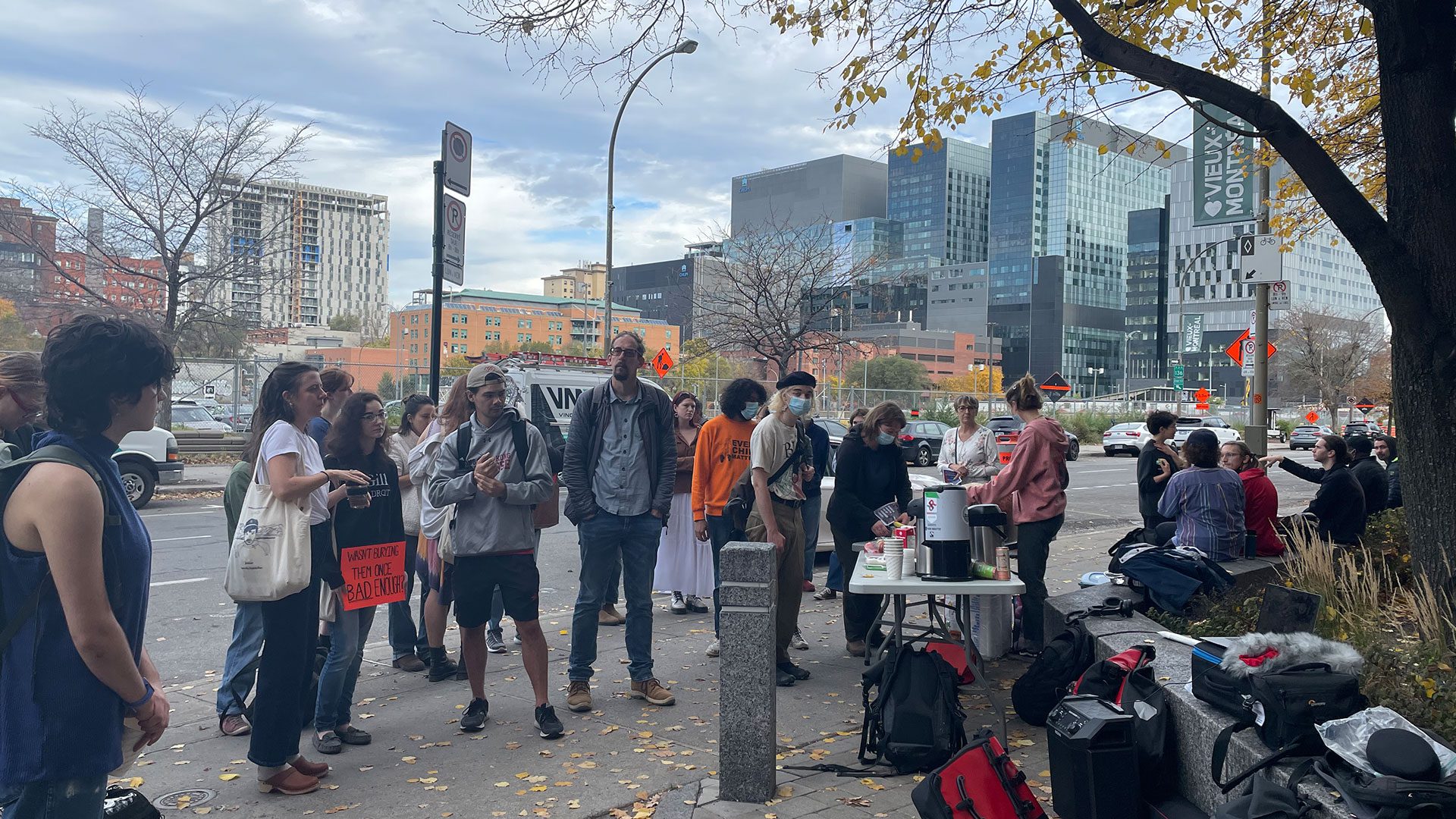The Mohawk Mothers, or Kanien’kehà:ka Kanistansera, obtained a temporary injunction against McGill University to stop the renovation and excavation of a hospital where group says unmarked graves are located.
“I feel like I just had a new baby, I do, because I feel like we’re closer to having our future generations heard, our past generations heard, and whatever has happened to our children, that they have purpose,” said Kwetiio, one of the Mothers.
Kwetiio, Kahentinetha and Karennatha represented themselves in court against several lawyers representing the defendants: McGill University, Société québécoise des infrastructures, the City of Montreal and the Attorney General of Canada, among others.
“You’ve never seen a case like this because there hasn’t been one. And quite frankly, the fact that Indigenous people can get justice in a courtroom is, it just goes to prove that we’re not completely shut out, but it does take extraordinary measures,” said lawyer Donald Worme, who, along with lawyer Julian Falconer, were present at the hearing as legal counsel for Kimberly R. Murray, the Special Interlocutor for Missing Children and Unmarked Graves and Burial Sites associated with Indian Residential Schools.
Calling themselves “traditional custodians of the land,” they presented their evidence before the court, including testimony from MK-Ultra psychological experiments survivor Lana Ponting, who said she had seen Indigenous children at the hospital when she was there and witnessed clandestine grave-digging in her affidavit.
They also presented research detailing the historic use of Indigenous children for medical experiments throughout the 20th century.
The judge said he hoped that this temporary injunction would allow more time for parties to engage in discussion so that the voices of the Kanistansera could be heard, and potentially pursue non-invasive modes of the archeological survey so the evidence would not be destroyed.
“The Mohawk Mothers took the weight of this on their shoulders without legal representation. The number of government parties in the room? Mind-boggling,” said Falconer.
“What came out of all of this is probably one of the most striking David and Goliath stories I have seen in a long time.”
Arkéos, the archeological firm hired by McGill to undertake an archeological survey of the grounds, had been digging on the site with a bobcat two weeks before the injunction ruling was made.
Two weeks prior to the Mohawk Mothers’ injunction hearing, the firm said that the likelihood of unmarked graves was “very low.”
However, Karohia’no:ron Dallas Canady-Binette, a Mohawk archeology student from Kanesatake, said that the project failed to properly include Indigenous consent.
“A big issue for me is that the Kanistansera at least have said that what they prefer is non-invasive methods. And they’ve said that several times that they’d prefer ground-penetrating radar, LIDAR, or aerial surveillance to be used as opposed to starting to dig,” he said.
There is also evidence that the site might have been home to a pre-colonial Iroquois village, something a 2016 Arkéos study also indicated.
Karohia’no:ron wrote an op-ed in the McGill Tribune criticizing Arkéos’ past archeological survey of those grounds. In 2016, McGill administration hired Arkéos to determine whether construction on the New Vic site would destroy any archeological artifacts — but failed to consult with any Indigenous people or use any Indigenous sources.
“What [Arkéos] did do is consult historical documents, they consulted geographical data about the environment, what kind of soil, stuff like that. They also constructed building, like planning documents from the city of Montreal, but there was no Indigenous perspective. They didn’t consult any knowledge keepers, they didn’t consult any documents even that were written by Indigenous peoples and specifically kanie’keha’ka,” said Karohia’no:ron.
The Mohawk Mothers repeated that no kaniekehaka consent was given for the New Vic project.
The Mohawk Council of Kanawake (MCK) was consulted, but as Chief Ross Montour from MCK told APTN News in a phone interview, McGill’s campus falls out of MCK jurisdiction. MCK is therefore unable to either approve or veto a project.
Mountour said the council was kept up-to-date with developments on the land, and mentioned that two First Nations representatives from Akwesasne were overseeing Arkéos’s archeological survey.
These digs sparked resistance from some McGill students, including the student executive and McGill’s Divest student group.
Val Masny, vice-president (external) of McGill’s student executive felt the university was rushing the process.
“If there’s even like a one percent chance that there are unmarked graves, we need to do things properly. Like to me it’s not a question of probability, it’s just a question of doing things the right way,” said Masny.
Kanistansera supporters rally outside Montreal’s superior court on Oct. 26. Photo: Emelia Fournier/APTN.
McGill students rallied outside the Montreal courthouse in solidarity with the Mohawk Mothers on Oct. 26 and many were present in the courtroom.
But not everyone in kanawake feels represented by the Mohawk Mothers.
APTN spoke with Debbie Delisle, a Mohawk Mother of the Turtle Clan, prior to the judges’ ruling. She’s also the elder in residence for McGill’s social work program.
“Everybody has a right to express whatever, and however. Is an injunction [right]? Not really, because they haven’t spoken to me. They haven’t presented their issue to the community. Can we invite the community to a gathering so we can express our concerns about it,” said Delisle.
Delisle said she would be willing to engage with the Mohawk Mothers provided they are open to discussion.
McGill did not respond to APTN’s request for comment and Arkeos was not available for an interview before deadline.
The case will be revisited in court towards the end of January early February at a case management hearing to see how both parties are doing with the discussions. At that time, if needed, a date will be set for another injunction hearing.










